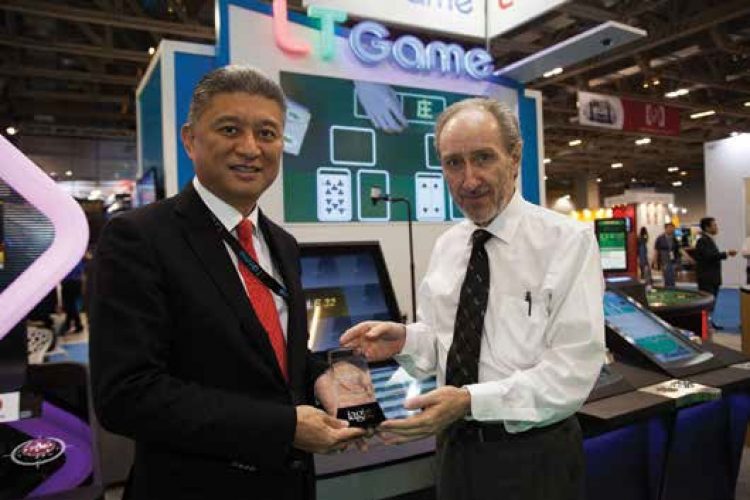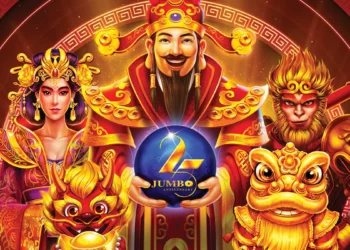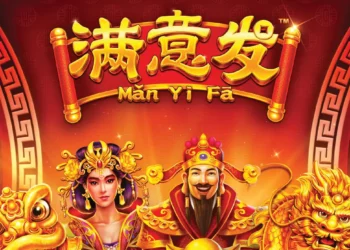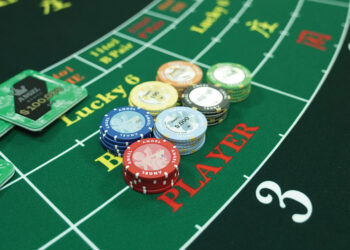Not content with dominating the electronic table gaming market in Macau, LT Game showed off a varied assortment of innovative new products at G2E Asia
Macau’s LT Game is undoubtedly the envy of many an electronic gaming machine supplier. Given the government’s cap on live gaming tables, Chinese players’ insatiable appetite for baccarat, the lowercosts involved in running electronic terminals versus live tables—as well as those terminals’ ability to drive marginal business from players unable to afford Macau’s now lofty live table minimums— there’s no shortage of demand for LT’s core product: electronic betting terminals used to make bets on baccarat games dealt by live dealers.
And, of course, there’s also the not inconsequential matter of LT having managed thus far to cling onto the exclusive right in Macau to sell those products.
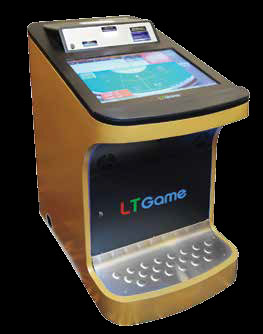
At last count, there were 3,239 LT terminals installed across Macau, and that number is sure to balloon over the coming years as casino floor space multiplies across all the sprawling Cotai resorts currently under construction—resorts that have reserved space hoping for allocations of live tables they are only likely to receive a fraction of. The logical solution will be to fill the resulting empty space with even more LT terminals.
Yet, LT Game Chairman Jay Chun is not content with merely having a stranglehold on the most lucrative gaming machine manufacturing business in town. A tireless inventor, he appears intent on providing a complete solution for his vision of the casino of the future, and was eagerly showing off several new products at last month’s G2E Asia.
One of the highlights was the E-Drop Box, developed based on Mr Chun’s belief that “In the future, all drop boxes will be electronic.” And unlike similar products being developed by competitors, LT’s E-Drop Box handles chips as well as cash and tickets.
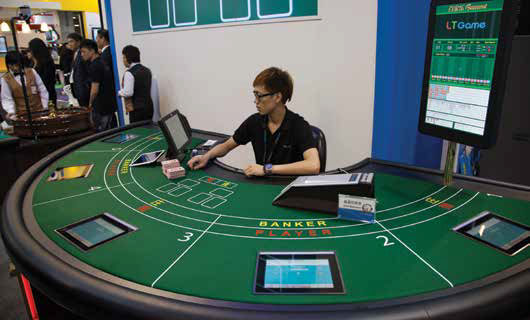
“No other machine can handle chips,” he stresses. “So you can take your slot ticket to the tables. It’s a new thing for the mass market.”
The E-Drop Box will also benefit Macau’s gaming regulator, the DICJ, according to Mr Chun. “This will be very good for operators and the DICJ, who need to closely monitor movement of cash between the table drop box and count room to ensure there is no leakage [because of the tax calculation]. By automating the count table-side, it makes transportation less problematic.”
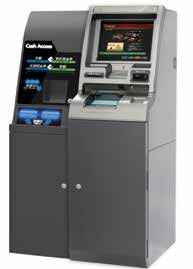
The Intelligent Cash Access kiosk is also part of the “chipless” casino operation at the Casino Macau Jockey Club.
Also on display was the E-Baccarat table, which made its live debut on 30th April at the Casino Macau Jockey Club. The Casino MJC functions as a “chipless” casino, in line with Mr Chun’s conviction that casinos in future will not use chips. Players ticket-in and ticketout at the E-Baccarat tables, and while they can still squeeze the cards to maintain the feel of the traditional game, all bets are made electronically on touchscreens, enhancing speed and efficiency.
Notably, many of Mr Chun’s inspirations derive from a realization back in 2004 when he first arrived in Macau that “with so many casinos being built, there would be a shortage of dealers”. Thus, both the live-dealer multiterminal games and the E-Baccarat tables were envisioned as significant labor saving devices.
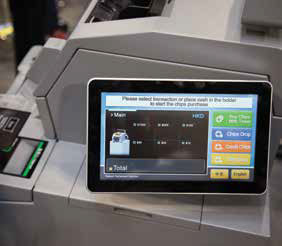
Among other items on display at the LT Game stand were unique games, including a standalone terminal with a personal dice-shaker that can be configured to run either sic bo or craps, and a terminal called Double 32 that allows baccarat players to simultaneously bet on up to 10 fast-moving games.
LT also is seeking to make its mark on community games with an electronic version of Texas Hold ’Em and e-table versions of mahjong and a popular Chinese card game called Dou Di Zhu (“Beat the Landlord”), a team game for three players with rules roughly similar to bridge.
Another one of Mr Chun’s creations is the Intelligent Cash Access kiosk, also part of the “chipless” casino operation at the Jockey Club. Not only do LT’s kiosks convert tickets to cash, like other kiosk products on the market, but they go a step further by allowing players to convert stacks of cash into tickets, which they can then go and use at either the E-Baccarat tables or LT terminals at the property.
According to Mr Chun, he had asked manufacturers to create such a kiosk for two years. “They didn’t, so I made it,” he says. And unlike competing products, his kiosk can also handle multiple currencies.
While Mr Chun comes up with the ideas for his gaming products, the task of turning the concepts into reality is left to a team of 100 developers based in Zhuhai and Shenzhen.
Mr Chun has also organized a Macau trade show to compete with G2E Asia, which he claims has not sufficiently adapted to local realities, creating an opening for a show with a broader purview and less of a focus on gaming machines than the slot-centric G2E Asia. Because even though Mr Chun makes gaming machines, he concedes they constitute only a small part of the overall Macau gaming market.
The second edition of Mr Chun’s Macao Gaming Show will take place 18th-20th November at The Venetian Macao, and it’s quite likely he’ll have more nifty inventions to show off then.






